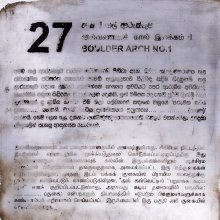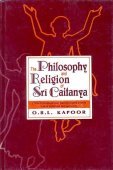Svabhavika, Svābhāvikā, Sva-bhavika, Svābhāvika: 18 definitions
Introduction:
Svabhavika means something in Buddhism, Pali, Hinduism, Sanskrit, Marathi, Hindi. If you want to know the exact meaning, history, etymology or English translation of this term then check out the descriptions on this page. Add your comment or reference to a book if you want to contribute to this summary article.
Svabhavika has 18 English definitions available.
Alternative spellings of this word include Swabhavik.
Images (photo gallery)
Languages of India and abroad
Sanskrit dictionary
[Deutsch Wörterbuch]
Source: Cologne Digital Sanskrit Dictionaries: Böhtlingk and Roth Grosses Petersburger WörterbuchSvābhāvika (स्वाभाविक):—(von svabhāva)
1) adj. (f. ī) dem eigenen Wesen angehörig, entsprungen, von Natur eigen, ursprünglich, natürlich, angeboren, inhärent [Āpastamba 1, 30, 11.] [MAITRYUP. 5, 1.] [ŚVETĀŚV. Upakośā 6, 8.] ṛtuḥ strīṇām [?3, 46. Mahābhārata 1, 267. Raghuvaṃśa 5, 69. 10, 80. Kumārasaṃbhava 6, 71. Spr. (II) 5896. 6522. 7290, v. l. zu Chāndogyopaniṣad S. 6. 26. zu Bṛhadāranyakopaniṣad S. 11. 51. WINDISCHMANN], Sancara [98.] [Nīlakaṇṭha 66. 259.] [Mārkāṇḍeyapurāṇa 49,14. 53,31. 56,23. fg.] [Bhāgavatapurāṇa 3,25,32.5,16,14.6,1,53.] [Oxforder Handschriften 89,b,39] (wohl svābhāvikaṃ zu lesen). [Hemacandra’s Abhidhānacintāmaṇi 508.] [Pañcatantra 66, 10. 110, 21.] [SARVADARŚANAS. 57, 18. 89, 9. 96, 6. 130, 16. fgg.] [Scholiast] zu [Kapila 1, 5.] [WILSON,] [SĀṂKHYAK. S. 142.] [Kullūka] zu [Manu’s Gesetzbuch 1, 64.] [KUSUM. 13, 19. 21.] [Siddhāntakaumudī] zu [Pāṇini’s acht Bücher 7, 4, 71.] angeboren von Krankheiten [CARAKA 1, 30. 3, 1.] [Suśruta 1, 1, 9. 4, 7. 11.] [Śārṅgadhara SAṂH. 1, 1, 5.] svābhāviketara [Sāhityadarpana 11, 16.] svābhāvikatva n. nom. abstr. [KUSUM. 17, 20. fg.] [Nīlakaṇṭha 66.] —
2) m. pl. Bez. einer buddhistischen Schule, die keinen Gott annimmt, sondern Alles aus sich selbst entstehen lässt, [BURNOUF,] [?Intr. 118. 441. fg. WILSON, Sel. Works 2, 12. fg. 21. fg. 24. fgg. 363.] —
3) adj. von 2): samādhi [JVĀLĀVALĪT. 28.]
Sanskrit, also spelled संस्कृतम् (saṃskṛtam), is an ancient language of India commonly seen as the grandmother of the Indo-European language family (even English!). Closely allied with Prakrit and Pali, Sanskrit is more exhaustive in both grammar and terms and has the most extensive collection of literature in the world, greatly surpassing its sister-languages Greek and Latin.
See also (Relevant definitions)
Partial matches: Bhavika, Shva.
Starts with: Svabhavika-nivasa, Svabhavika-vriddhi, Svabhavikagati, Svabhavikata, Svabhavikate.
Ends with: Asvabhavika.
Full-text (+34): Svabhaviki, Svapavikam, Cuvapavikam, Svabhava, Mukharaga, Vinitatva, Pravikatthate, Svabhaviketara, Sahavia, Pratitika, Arthabhidhana, Swabhavik, Svabhavya, Svabhavikagati, Aishvarika, Svabhavaja, Nathavinem, Nasa, Svaja, Paribhashika.
Relevant text
Search found 36 books and stories containing Svabhavika, Sva-bhavika, Svā-bhāvika, Svā-bhāvikā, Svābhāvikā, Svābhāvika, Svabhāvika; (plurals include: Svabhavikas, bhavikas, bhāvikas, bhāvikās, Svābhāvikās, Svābhāvikas, Svabhāvikas). You can also click to the full overview containing English textual excerpts. Below are direct links for the most relevant articles:
Manusmriti with the Commentary of Medhatithi (by Ganganatha Jha)
Verse 3.46 < [Section V - Duties of Marital Life]
Mandukya Upanishad (Madhva commentary) (by Srisa Chandra Vasu)
Karika verse 2.10 < [Chapter 2 - Second Khanda]
Bhakti-rasamrta-sindhu (by Śrīla Rūpa Gosvāmī)
Verse 1.2.185 < [Part 2 - Devotional Service in Practice (sādhana-bhakti)]
Verse 1.2.184 < [Part 2 - Devotional Service in Practice (sādhana-bhakti)]
Vakyapadiya of Bhartrihari (by K. A. Subramania Iyer)
Verse 3.14.196 < [Book 3 - Pada-kāṇḍa (14): Vṛtti-samuddeśa (On Ccomplex Formation)]
Verse 2.407 < [Book 2 - Vākya-kāṇḍa]
Verse 3.4.1-2 < [Book 3 - Pada-kāṇḍa (4): Dravyalakṣaṇa-samuddeśa (On Substance)]
The gods of northern Buddhism (by Alice Getty)
Cidgaganacandrika (study) (by S. Mahalakshmi)
Verse 262 [Kāli’s greatness revealed] < [Chapter 4 - Fourth Vimarśa]
Related products


